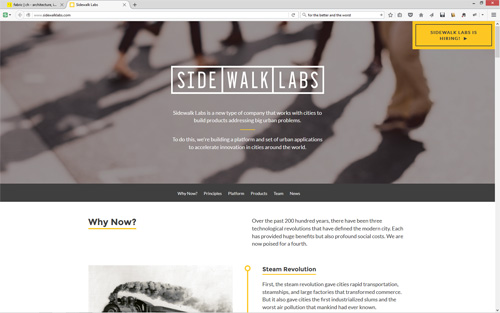Note: Sidewalks Labs is a Google spinoff with some new "messianic" ("make the world a better place") views. And soon, for the better and the worst (place), will we all literally inhabit inside Google and push some more data to feed the beast.
The message is somehow simplistic --see below-- considering how complicated and messy a city can be. It's a market driven message of course, but it nonetheless tells the architect community how far their discipline could be further taken out of their hands. It could truly happen if most of them continue to consider that "technical things" are to be left to "technicians"... and don't modify architecture or even the very nature of "space" .
We should probably reconsider here the amazing propositions and theories somebody like Reyner Banham made in books such as The Architecture of the Well tempered Environment back in the 70ies, to see how far we are from what it could be (considering air conditioning techs for exemple).
Via Sidewalks Labs
-----
" Sidewalk Labs is a new type of company that works with cities to build products addressing big urban problems.
To do this, we're building a platform and set of urban applications to accelerate innovation in cities around the world."

Why Now?
Over the past 200 hundred years, there have been three technological revolutions that have defined the modern city. Each has provided huge benefits but also profound social costs. We are now poised for a fourth.
Steam Revolution

First, the steam revolution gave cities rapid transportation, steamships, and large factories that transformed commerce. But it also gave cities the first industrialized slums and the worst air pollution that mankind had ever known.
Electricity Revolution

Second, the electricity revolution gave us lights, subways and elevators. But electricity also allowed us to block the sunlight, retreat to artificial environments and warehouse people in high-rises.
Automobile

Third, the automobile allowed the city to expand in every direction, enabling access to more opportunities and weekend retreats. But it also gave us sprawl, traffic jams, smog and nearly killed the central city.
Digital Technology is Ready to Transform Cities

Smartphones already shape how people interact with cities. A new set of digital technologies - ubiquitous connectivity, real-time sensors, precise location services, distributed trust, autonomous systems and digital actuation and fabrication - can collectively transform city life. But towards what end? Will they make the city more responsive, equitable, innovative and human or will they challenge civil liberties and security?





